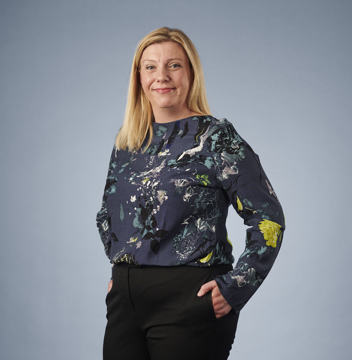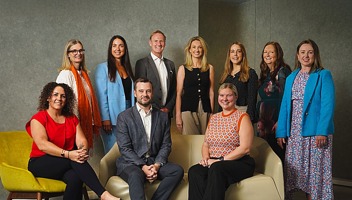To us, respect and inclusion are about recognising that everyone is different and creating a business that values those differences.
As part of our ongoing work with the Salvesen Mindroom, we are delighted to be sponsoring the “It Takes all Kinds of Minds” (ITAKOM) conference on 13th-14th March 2023.
ITAKOM is an international conference entirely focused on the far-reaching concept of neurodiversity, bringing together different perspectives so we can better understand neurodiversity and help create a neurodiversity affirmative world.
Our Inclusion and Wellbeing Manager, Emma Smith spoke to ITAKOM to discuss the steps we have undertaken to champion neuroinclusivity.
ITAKOM: “Emma, when did Burness Paull first start thinking about neuro-inclusion at work?”
Emma: “Neuroinclusion is something we had started to think about just prior to the pandemic. We have worked with organisations in the past to help us support neurodivergent employees and we have implemented some changes to our recruitment and selection processes over the past 2-3 years to ensure we are more inclusive. However, thanks to our partnership with SMC we have really accelerated the work that we are doing to become a more neuroinclusive employer, particularly in terms of education, awareness raising and reducing the stigma often associated with neurodiversity, which is enabling us to better understand what we can do to support our ND colleagues to reach their full potential at work.”
ITAKOM: “What amendments have you made to your recruitment procedures to make them more mind-friendly?”
Emma: “As a business, one of our main goals is to ensure that we are recruiting from the widest pool of talent possible. We have made several changes to our recruitment and selection processes – we are clear in our application process that we welcome applications from everyone and that reasonable adjustments can be made within our process for applicants with ND conditions.
Just over a year ago we invested in a behavioural assessment platform which we are confident reduces barriers to entry, particularly within our graduate recruitment process, allowing us to assess candidate potential based on a combination of indicators rather than relying on aptitude testing and interview alone. One of the main drivers for investing in this platform is that it shows no adverse impact on ND applicants.
We welcome requests for adjustments within our process for candidates who disclose a ND condition – this may result in additional time being added to assessments, to offering a quiet space for candidates to complete the testing. We know that everyone is different, and the challenges vary widely from person to person so are very much guided by the candidate in terms of adjustments whilst still ensuring a fair and transparent process. Our graduate interviews are also CV blind which mitigates the risk of unconscious bias at this stage of our process, and we have recently introduced an inclusive recruitment toolkit for managers that includes specific information on being a ND inclusive interviewer.”
ITAKOM: “And what about the neurodiversity and the physical work space; is this something your team have thought about?”
Emma: “This is a particularly relevant for us at the moment. We have just moved to new premises in Glasgow and will soon be doing the same in Aberdeen. It’s great to see that our new spaces really do have something for everyone – quiet spaces, single pods, collaboration areas etc. I often find that when thinking about ‘best practice’ for ND colleagues, it’s really just best practice for everyone. Recognising that everyone is different and providing an element of choice for employees just makes sense and helps everyone to reach their full potential.
The challenges can be much more significant for those with ND conditions but in general everyone has preferences as to how they work best, some people concentrate better in noisy environments and some in quiet spaces. Some like it to be warmer, others cooler and lighting can impact everyone differently so why not provide spaces that allow for variations in all these things?
Hot desking can be a particular challenge and we do have a number of colleagues who have been allocated ‘fixed’ desks in all of our offices and this works well. Again, what’s important is being able to have an open conversation and feeling comfortable talking to your manager or HR about what your particular challenges are and working out a solution together.”
ITAKOM: “Outside of your own employees experience, have you changed customer touchpoints?”
Emma: “We probably don’t have as many client-facing touchpoints as some sectors, however, as a result of our work with SMC, we are currently working with an external auditor to assess the accessibility of our website for external users; this includes clients and also potential recruits. As mentioned, we do have various spaces within our offices in which we can accommodate ND clients who come in for meetings and it is important to us that we are creating a culture where our clients feel comfortable talking to us about things that will make a difference to them whether that is lighting, location, noise levels or number of people included in a meeting.”
ITAKOM: “For employees, who are also parents/carers, what kind of policies do you have around time off / flexibility?”
Emma: “A number of our colleagues are parents/carers of ND children, or have friends who are, and that is one of the reasons that this topic is so important to us, and also why our colleagues have engaged with it so well.
We pride ourselves on being a supportive employer at Burness Paull. We absolutely understand that our colleagues have a life outside the office and our hybrid working arrangements are designed to ensure our colleagues have maximum flexibility to balance their work and personal lives. We also have generous leave policies which include additional paid (flexi) leave on top of parental leave and sickness absence. Flexibility is key and it is really important to us that all our colleagues feel they can be open and honest with their line manager if they need support or additional time off and we can work together to make it work. We are very lucky that this is one of the areas that SMC specialises in and we are working with them to develop the support that we offer to parents and carers including information sessions and signposting.”
ITAKOM: “What about your employee’s mental health?”
Emma: “This is so important within our sector. We have been working really hard over the past 4 years to break down the stigma and discrimination around poor mental health and promote a positive mental health culture. We work closely with See Me Scotland’s, MHFAs, MBC. The most important thing to us is opening up the conversation and people feel comfortable talking and confiding us when they are struggling. We do have an EAP and cashback medical and PMI which all offer a 24/7 helpline and ongoing counselling and mental health support, however we know that often uptake is low and that’s why we have recently launched a dedicated onsite counselling service. This service offers accessible, confidential wellbeing support and sessions can cover everything from sleep and relationship issues to workplace concerns and acute mental health issues. So far the feedback has been fantastic.”
Originally posted by ITAKOM.

Emma Smith
Inclusion & Wellbeing Manager
Responsible Business
Emma is the Inclusion & Wellbeing manager and leads on diversity and inclusion, as well as employee health and wellbeing across the firm.
Latest News
Error.
No results.

Burness Paull becomes the first law firm to sign up to the Pathways Pledge
30/10/2025
Burness Paull has become the first law firm to sign up to the Pathways Pledge, an initiative created by Pathways Forward which aims to raise the participation of women in the entrepreneurial economy.

Burness Paull Funds partners recognised in the Lexology Index: Private Funds 2026 and Client Choice 2026 reports
17/12/2025
Funds partners Paula Kennedy and Andrew Christie have been recognised in the Lexology Index: Private Funds 2026 and Client Choice 2026 reports.

Burness Paull contributes to independent report aimed at building more globally competitive companies in Scotland
11/11/2025
An independent report Scaling Scotland: Building the Engine for the Next 50 Years of Prosperity, which supports the development of more globally competitive companies in Scotland, was published today.
{name}
{properties.pageSummary}
{properties.headline}
{properties.pageDate|date:dd/MM/yyyy}
{properties.shortDescription}
